GSAS Students Gain New Experience Through Summer Internships
September 1, 2023
Abigail Arnold | Graduate School of Arts and Sciences
For graduate students, summer doesn’t necessarily mean a break from work. For many, it’s a chance to build on existing skills and experiences and to further explore their academic and professional interests. This year, many GSAS students did this through summer internships, which they found in a wide range of fields and some of which were funded through Brandeis initiatives. These internships have many advantages for students, allowing them to do innovative work that is linked to their academic pursuits but also allows them to explore a range of career possibilities. Five students from different GSAS programs spoke to us about their internship experiences.
Savita Maharaj, English PhD, Boston Public Schools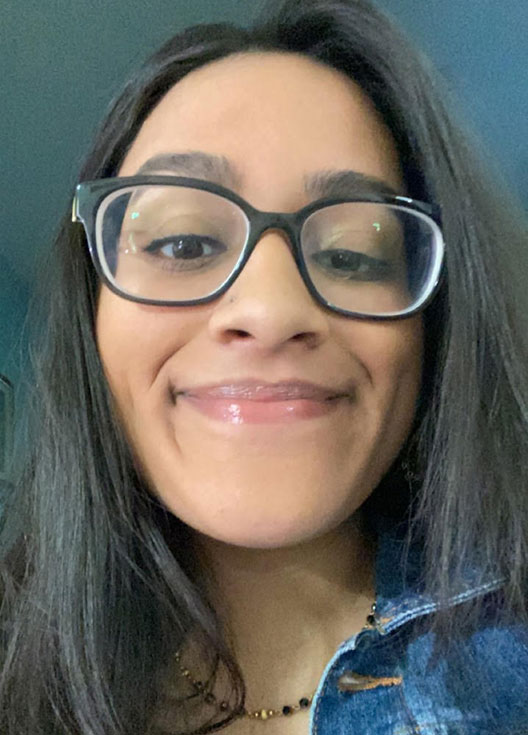
Savita Maharaj, a second-year PhD student in English, had an internship in curriculum development with the Boston Public Schools, working with Angela Hedley-Mitchell, the Program Director for History and Social Studies. Her internship was funded by the Connected PhD grant from the Andrew W. Mellon Foundation, which has provided Brandeis PhD students in the arts, humanities, and social sciences with opportunities to explore non-academic careers for the past four years. Maharaj’s internship was spurred by her interest in working with high school students and by her past experience in her undergraduate studies; while working on a project with her undergraduate advisor, she connected with Hedley-Mitchell. Upon hearing about the Connected PhD, she got the idea for the internship and received support from Faculty Director Jonathan Anjaria of GSAS’s Professional Development team in navigating the application process. “He is super encouraging to apply for different things or to find things that suit my interests,” said Maharaj.
Maharaj was especially excited about the ways her internship allowed her to make her academic studies a part of the high school curriculum and to build her skills and level of responsibility. She began with some database and administrative tasks and then moved on to creating materials for professional development courses for teachers on Caribbean enslavement, as well as developing survey courses geared towards high school students. “Since that’s my field of focus, it’s cool to make that information more accessible to high school students,” she said, adding Hedley-Mitchell wanted her to develop material that “gives teachers more tools to speak about genocides, because she feels like there’s a gap in the curriculum.” She also noted how she was able to use materials from an independent study she did with Professor Ulka Anjaria and a course she took with Professor Emilie Diouf in the English department when developing materials for the course she designed. “I love being able to create the content I wish I had,” said Maharaj, explaining that she did not engage with this content until college. “I think Hedley-Mitchell’s feedback is great, and she’s engaging with me as a person as well.” The two already hope to extend the internship beyond the summer.
Maharaj appreciated the way her internship allowed her to combine her academic focus with other interests and career goals, showing her different paths she could take with her PhD. ”When I started my PhD I was scared that if I was in academia I would lose sight of high school and the people I’m working for,” she said. However, Ulka Anjaria emphasized the idea of having multiple plans to her. Of her internship, she said, “I realized doing this brings me a lot of joy” and that it gives her another way to connect with high school students, even without being in the classroom directly. She advised other students to reach out to the Professional Development team for help finding similar opportunities. “Don’t limit yourself because you’re in a PhD program and trying to fulfill your perception of what that means,” she said; instead, she encouraged students to apply their skills in different ways and do something that interests them.
Mariel Mayz, Music Composition and Theory PhD, Porto Pianofest
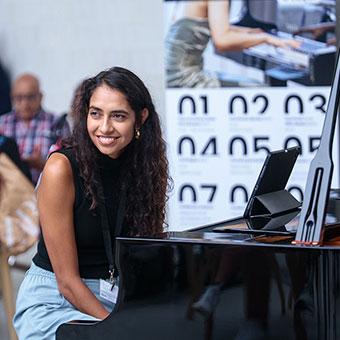 Photo credit: André Rodrigues
Photo credit: André Rodrigues
Mariel Mayz, a third-year PhD student in Music Composition and Theory, had an internship with the Porto Pianofest, a music festival in Portugal that has both pedagogical and public-facing sides. This year’s festival was the eighth edition of the event, which Mayz has been with since “their very beginnings” in 2016; she is now the associate director for the organization, a small non-profit. She received Social Justice Internship Funding from GSAS to support her with the internship, aligned with the festival’s goals of bringing people together and increasing the accessibility of music and music education to all people, regardless of their economic status. Mayz noted that one of the festival team’s long-term goals is to “have as many scholarships as possible to level the playing field of who can attend the festival.” This year, they also focused on curating more concerts for families and children and are “very proud of that.”
Mayz also observed the many ways in which her work with the festival both connected with her work in her academic program and allowed her to develop additional skills. She said that the Brandeis music faculty’s focus on the specifics of pieces of music, rather than solely their historical background, “has opened [her] eyes when it comes to designing programs. Sometimes you think Beethoven or Stravinsky might be too serious [for kids] because of all the baggage that comes with them…But when you’re studying the pieces, it’s all about the sound.” She also said that her experience with the festival helped her build skills in thinking about the big picture versus individual to-do items: “It’s not just a list of things to do; it’s really different threads that make up this festival.”
Finally, Mayz celebrated the way in which the festival re-energized her to the joy of music. She said, “My favorite part is actually being there for the festival week…It’s a lot of work, but it’s so worth it when the festival is actually happening. It’s my favorite time of year. I get to listen to concerts all week; I get to be around amazing musicians, young and old, all week; and it fuels my entire year.” She encouraged other students in creative fields to seek out similar opportunities, saying, “Even if you’re not the performer or the artist in the moment, I think doing administrative tasks within the arts world gives us a different perspective on the art itself and helps us to think about it differently when we go back to our creative side. When I show up at Brandeis in September, I always feel way more energized to do the creative side. Don’t shy away from the administrative part of things.”
Daniel Ruggles, Politics PhD, Boston CASA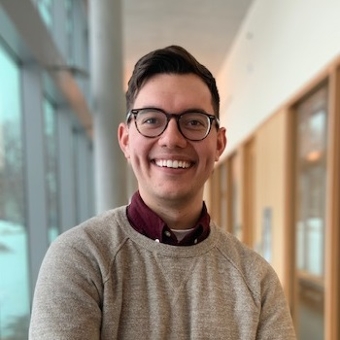
Daniel Ruggles, a fifth-year PhD student in Politics, held an internship with Boston CASA, a nonprofit that supports youth in the foster care system. This was Ruggles’s second year working with the organization, and his internship was supported by Social Justice Internship Funding from GSAS (last year, it was funded by the Connected PhD Grant). Because it was his second year, he was able to build on and learn from last summer’s experiences. While working on a project to help CASA track their outcomes, last summer he did a lot of research and attempted to track down former youth participants without many results; this year, he is instead focusing on surveying and interviewing former and current volunteers to understand their experiences. He observed the need for trial and error in figuring out what can happen in a non-profit internship setting, noting that he learned how to adapt his ideas of what would be the best evidence in an academic setting while still meeting the goals of understanding outcomes and how the program is working.
Ruggles was especially interested in the differences in the experience of working in academic research and in a non-profit setting, while also observing the ways that his work with CASA connected to and illuminated his research. He loved how different it felt to be working with people rather than historical records and feeling an immediate impact. While his dissertation focuses on the mobilization and empowerment of young conservatives in the 1960s and 1970s, his internship allows him to look at obstacles to the mobilization of young people. He hopes to someday write an article incorporating this experience, which has shown him how history’s stakes continue today and empowered him to think about not constraining himself to certain ideas of politics and political science.
When asked about advice for other students who plan on doing internships, Ruggles’ watchword was “flexibility.” He emphasized that student interns need to be able to adapt to the idea that what they came in thinking they would accomplish is not necessarily going to happen and that they need to learn to prioritize the most important aspects of a project. He also advised other students to ask organizations if they are open to a summer intern and to seek out funding from Brandeis for these opportunities, which can make working with a non-profit possible.
Annika Sparrell, Computational Linguistics MS, Inficon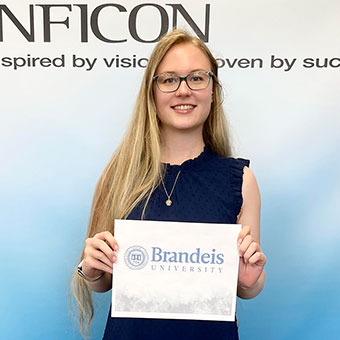
Annika Sparrell, a second-year master’s student in Computational Linguistics, had an internship with Inficon, a company that manufactures semiconductors and sensors. After applying to many internships on LinkedIn and Indeed in the spring, she found this one, where they were specifically looking for someone with skills in her field of natural language processing. Over the summer, she worked on a team that made software to monitor semiconductor manufacturing, as part of a small sub-team that did data analysis. She mainly worked on creating a custom search function to help explore documentation for people in the company.
In her role, Sparrell was able to apply almost everything she learned in Professor Peter Anik’s Information Retrieval course, which she took at Brandeis in the spring. While it was her fifth course in a hard term, she decided to go for it, and it paid off in supporting her through her summer experience. Over the summer, she also learned new skills in software design and the different techniques needed in programming for a company (as opposed to for homework). She also gained new experience working in an office setting with a great and supportive team and liked seeing the business side of her field. Sparrell noted that she has become much more comfortable programming in Python both through her studies at Brandeis and through her internship. She has often stopped and thought, “Oh, I can do these things now that a number of years ago I would have struggled with.”
Sparrell’s internship has given her experience that has helped her decide what she wants to focus on in her second year to give herself “the best foundation” for her future career plans. She would like to have a career in industry, “so having as much work experience in the field as possible is always a benefit.”. When asked what she would tell other students looking for internship opportunities, she advised them “not give up and to figure out what skills you most want to get out of an internship, and, if you do have such an opportunity, to apply yourself to learn as much as you can.”
Víkko Suàrez Casanova, Neuroscience PhD, Office of Technology Licensing at Brandeis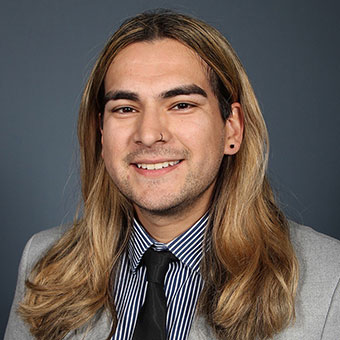
Víkko Suàrez Casanova, a fifth-year PhD student in Neuroscience, interned with Brandeis’s Office of Technology Licensing (OTL). The experience came out of a conversation he had during one of GSAS’s 70th anniversary celebration events. While talking with Rebecca Menapace, Associate Provost for Innovation and the Executive Director of OTL, he mentioned that he was applying to internships and looking to get more experience outside the lab as he approached graduation, and she told him about the position. In his role this summer, Suàrez Casanova got to bring together the business and science fields, assisting Rajnish Kausik, Director of Licensing and Strategic Alliances, in the crafting of technology agreements, assessment of patent viability and prosecution, and spearing a technology marketing summary campaign.
Suàrez Casanova emphasized the transferable skills from their lab experience, as well as how the internship allowed them to see how these skills fit into the bigger picture. They were able to use their specialized knowledge of science to understand the inventions that came out of Brandeis’s labs and learned to conduct a competitive landscape analysis to determine the commercialization potential of the technology. He remarked, “The Neuroscience program provided me with the training to critically assess the science behind the technology, and, through the many options to engage in discussion, I felt comfortable speaking to both expert and lay audiences.” With this internship, even when they were not in the lab, they said, “I’m still engaging in science, seeing what’s out there, seeing what the trends are, seeing more of the translational side of science: how an idea can become a product.” This allowed them to see how their individual dissertation project would fit into the bigger picture and how ideas go from basic research to the market.
Suàrez Casanova also said that this internship “opened up a new avenue” for him in terms of career possibilities. While he was previously thinking more about teaching-focused academic positions, working in technology transfer would be another field that would allow him to work intimately with science at a university. He has been talking with people about potential jobs in the field. He encouraged other students to explore internships as well in order to see the possibilities that are out there. “The more experience you get, the better,” he said. “I think it’s important just to see what’s on the other side of the PhD. Sometimes we get tunnel vision focusing on just graduating, but it’s never too early to start planning for the next step of our careers.”






